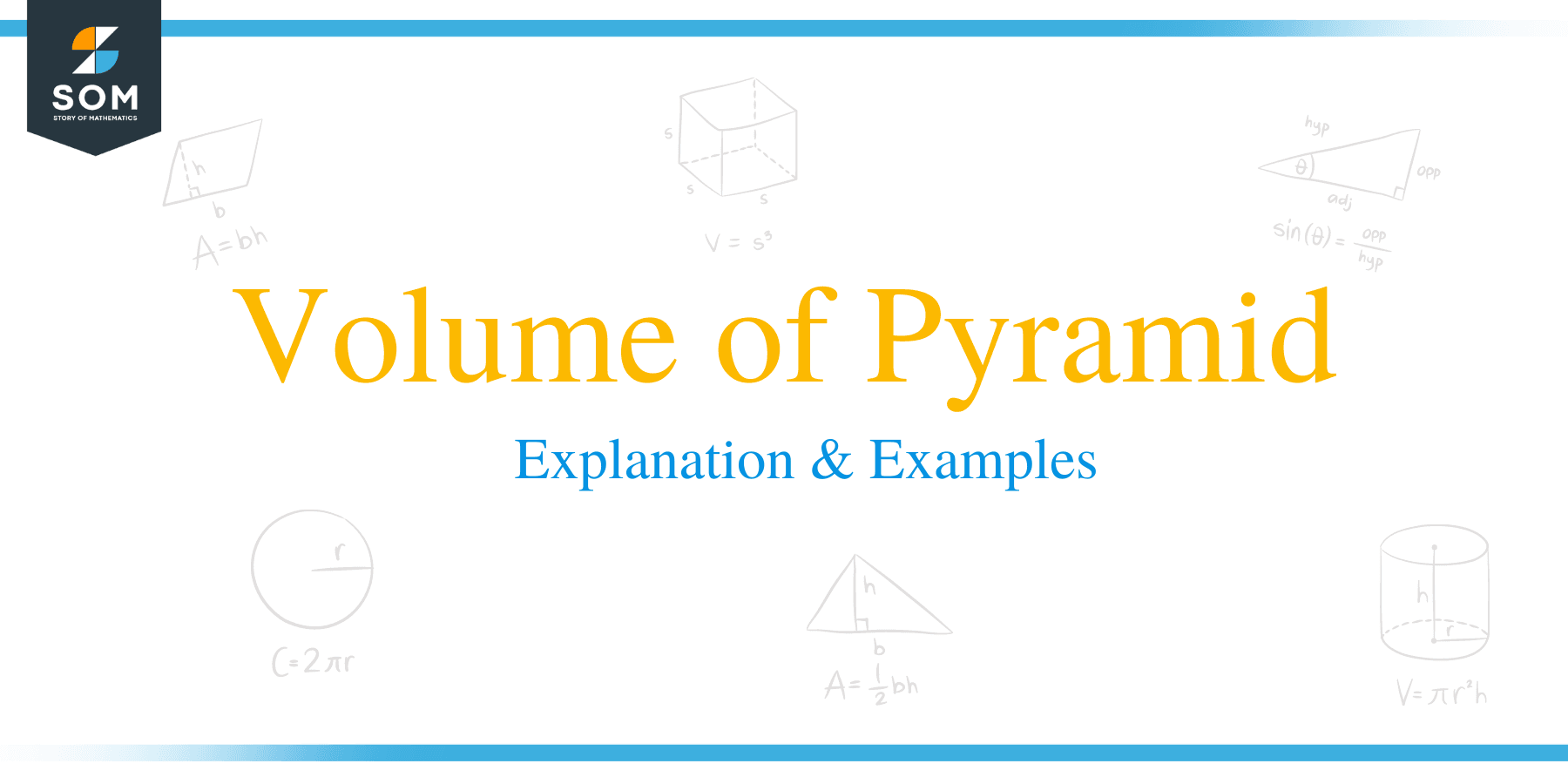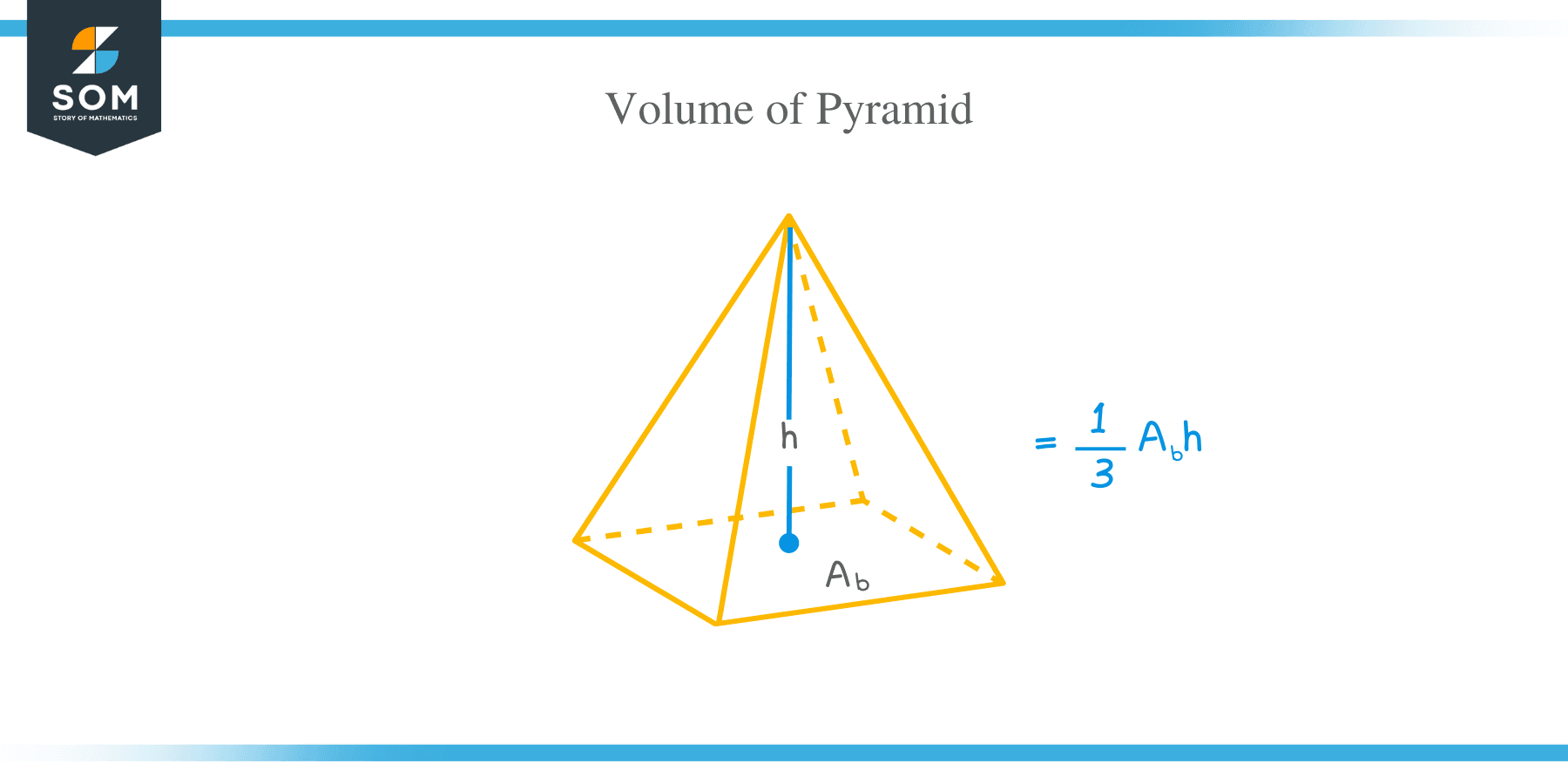- Home
- >
- Volume of Pyramid – Explanation & Examples
JUMP TO TOPIC
Volume of Pyramid – Explanation & Examples
 A pyramid is a 3-dimensional diagram whose polygonal base is connected to the apex by triangular faces in geometry. The triangular faces of a pyramid are known as lateral faces, and the perpendicular distance from the apex (vertex) to the base of a pyramid is known as the height.
A pyramid is a 3-dimensional diagram whose polygonal base is connected to the apex by triangular faces in geometry. The triangular faces of a pyramid are known as lateral faces, and the perpendicular distance from the apex (vertex) to the base of a pyramid is known as the height.
Pyramids are named after the shape of their bases. For instance, a rectangular pyramid has a rectangular base, a triangular pyramid has a triangular base, a pentagonal pyramid has a pentagonal base, etc.
How to Find the Volume of a Pyramid?
In this article, we discuss how to find the volume of pyramids with different types of bases and solve word problems involving a pyramid’s volume.
The volume of a pyramid is defined as the number of cubic units occupied by the pyramid. As stated before, the name of a pyramid is derived from the shape of its base. Therefore, the volume of a pyramid also depends on the shape of the base.
To find the pyramid’s volume, you only need the dimensions of the base and the height.
Volume of a pyramid formula
The general volume of a pyramid formula is given as:
Volume of a pyramid = 1/3 x base area x height.
V= 1/3 Ab h
Where Ab = area of the polygonal base and h = height of the pyramid.
Note: The volume of a pyramid varies slightly depending on the polygonal base.
Example 1
Calculate the volume of a rectangular pyramid whose base is 8 cm by 6 cm and the height is 10 cm.
Solution
For a rectangular pyramid, the base is a rectangle.
Area of a rectangle = l x w
= 8 x 6
= 48 cm2.
And by the volume of a pyramid formula, we have,
Volume of a pyramid = 1/3Abh
= 1/3 x 48 cm2 x 10 cm
= 160 cm3.
Example 2
The volume of a pyramid is 80 mm3. If the pyramid’s base is a rectangle that is 8 mm long and 6 mm wide, find the pyramid’s height.
Solution
Volume of a pyramid = 1/3Abh
⇒ 80 = 1/3 x (8 x 6) x h
⇒ 80 = 15.9h
By dividing both sides by 15.9, we get,
h = 5
Thus, the height of the pyramid is 5 mm.
Volume of a square pyramid
To obtain the formula for the volume of a square pyramid, we substitute the base area (Ab) with the area of a square (Area of a square = a2)
Therefore, the volume of a square pyramid is given as:
Volume of a square pyramid = 1/3 x a2 x h
V = 1/3 a2 h
Where a = side length of the base (a square) and h = height of the pyramid.
Example 3
A square pyramid has a base length of 13 cm and a height of 20 cm. Find the volume of the pyramid.
Solution
Given:
Length of the base, a = 13 cm
height = 20 cm
Volume of a square pyramid = 1/3 a2 h
By substitution, we have,
Volume = 1/3 x 13 x 13 x 20
= 1126.7 cm3
Example 4
The volume of a square pyramid is 625 cubic feet. If the height of the pyramid is 10 feet, what are the dimensions of the pyramid’s base?
Solution
Given:
Volume = 625 cubic feet.
height = 10 feet
By the volume of a square formula,
⇒ 625 = 1/3 a2 h
⇒ 625 = 1/3 x a2 x 10
⇒ 625 = 3.3a2
⇒ a2 =187.5
⇒ a = = √187.5
a =13.7 feet
So, the dimensions of the base will be 13.7 feet by 13.7 feet.
Example 5
The base length of a square pyramid is twice the height of the pyramid. Find the dimensions of the pyramid if it has a volume of 48 cubic yards.
Solution
Let the height of the pyramid = x
the length = 3x
volume = 48 cubic yards
But, the volume of a square pyramid = 1/3 a2 h
Substitute.
⇒ 48 = 1/3 (3x)2 (x)
⇒ 48 = 1/3 (9x3)
⇒ 48 = 3x3
Divide both sides by 3 to get,
⇒ x3 =16
⇒ x = 3√16
x = 2.52
Therefore, the height of the pyramid = x ⇒2.53 yards,
and each side of the base is 7.56 yards
Volume of a trapezoidal pyramid
A trapezoidal pyramid is a pyramid whose base is a trapezium or a trapezoid.
Since we know, area of a trapezoid = h1 (b1 + b2)/2
Where h = height of the trapezoid
b1 and b2 are the lengths of the two parallel sides of a trapezoid.
Given the general formula for the volume of a pyramid, we can derive the formula for the volume of a trapezoidal pyramid as:
Volume of a trapezoidal pyramid = 1/6 [h1 (b1 + b2)] H
Note: When using this formula, always remember that h is the height of the trapezoidal base and H is the height of the pyramid.
Example 6
The base of a pyramid is a trapezoid with parallel sides of length 5 m and 8 m and a height of 6 m. If the pyramid has a height of 15 m, find the volume of the pyramid.
Solution
Given;
h = 6 m, H = 15 m, b1 =5 m and b2 = 8 m
Volume of a trapezoidal pyramid = 1/6 [h1 (b1 + b2)] h
= 1/6 x 6 x 15 (5 + 8)
= 15 x 13
=195 m3.
Volume of a triangular pyramid
As we know, the area of a triangle;
Area of a triangle = 1/2 b h
Volume of a triangular pyramid = 1/3 (1/2 b h) H
Where b and h are the base length and height of the triangle. H is the height of the pyramid.
Example 7
Find the area of a triangular pyramid whose base area is 144 in2 and the height is 18 in.
Solution
Given:
Base area = 144 in2
H = 18 in.
Volume of a triangular pyramid = 1/3 (1/2 b h) H
= 1/3 x 144 x 18
= 864 in3
